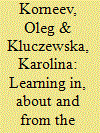|
|
|
Sort Order |
|
|
|
Items / Page
|
|
|
|
|
|
|
| Srl | Item |
| 1 |
ID:
154712


|
|
|
|
|
| Summary/Abstract |
Numerous international organizations play a key role in generating and sustaining migration governance across the world in the absence of a global migration regime. However, global governance scholarship lacks grounded understanding of their role, which is often rejected or simply left unnoticed. In rare cases when IOs do get academic attention, light is shed on two referent “migration” IOs—the International Organization for Migration and the UN High Commissioner for Refugees—while other IOs remain in their shadow. Drawing on the case of the post-Soviet Central Asia, which is characterized by both significant migration dynamics and multilayered governance but has so far escaped attention of migration governance scholars, this article takes two steps for establishing a new research agenda. First, it deploys and applies to IOs the concept of global migration governors defined as authorities who exercise power across borders for the purpose of affecting migration policy. Second, it moves discussion beyond the referent IOs and demonstrates the role of often overlooked nonreferent IOs, such as the World Bank, active in the field of migration governance. This analysis is based on fieldwork in Kazakhstan, Kyrgyzstan, Tajikistan, Uzbekistan, and Russia conducted in 2011–2015.
|
|
|
|
|
|
|
|
|
|
|
|
|
|
|
|
| 2 |
ID:
190174


|
|
|
|
|
| Summary/Abstract |
Examining the European Union’s (EU) engagement with Central Asia since the early 1990s, we see an increased commitment to context sensitivity. Arguably, in order to design ‘better’ interventions, the EU needs to know more about this region. This article explores three means of EU learning: in the field – through EU officials’ first-hand experience of working at EU Delegations in Central Asia; about the field – through programmed channels of external expert knowledge, and in particular think tanks; and from the field – during institutionalized consultations with multiple local actors, such as academics, journalists and non-governmental organizations. It is argued that despite this complex learning infrastructure, EU knowledge production on Central Asia has a predominantly performative character. Rather than leading to changes in its relations with Central Asia, new knowledge produced by the EU aims at legitimizing this organization’s pre-existing frameworks of engagement and practices of interactions with the region, and substantiating existing policy priorities.
|
|
|
|
|
|
|
|
|
|
|
|
|
|
|
|
|
|
|
|
|